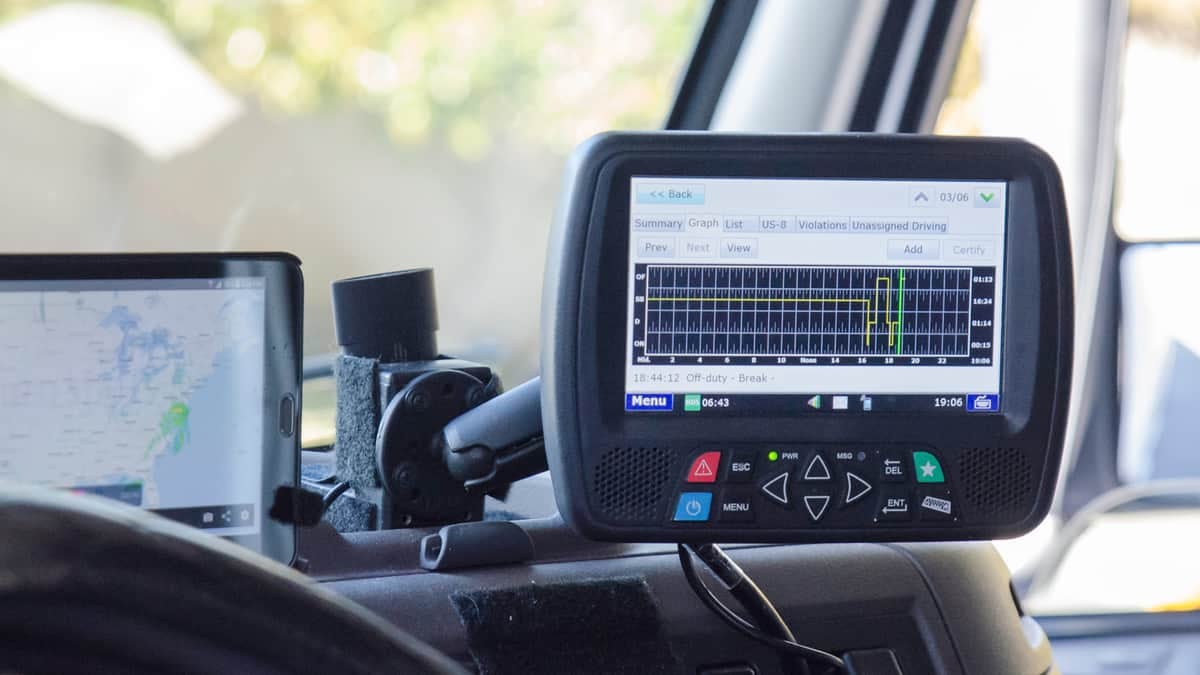The long-awaited proposed changes to federal hours-of-service (HOS) rules for trucking failed to impress most drivers who spoke with FreightWaves, while a group representing independent operators praised increased flexibility that extends the workday.
The Federal Motor Carrier Safety Administration (FMCSA) on Wednesday, August 14, released five proposals intended to ease driving rules for truckers who haul 70 percent of the nation’s freight. The agency will accept public comment for 45 days before finalizing the new rules.
An Advanced Notice of Proposed Rulemaking issued in August 2018 drew more than 5,200 comments. Many criticized a 30-minute rest break required during or immediately after eight hours of driving. Under the proposal, the break could be satisfied by a driver using on-duty, not driving status, rather than off-duty.
“The 30-minute break is a joke. We don’t need it,” said Alex Costerus, a Colorado-based contractor for LandStar System Inc. (NASDAQ: LSTR).
Three-hour pause
The FMCSA also proposed allowing drivers to pause their electronic logging devices (ELD) for up to three hours during a workday. That effectively stretches the 14-hour workday to 17 hours, though the allowable time behind the wheel remains 11 hours in a 14-hour period.

“I think this proposal is another way for carriers to exploit their drivers,” Tim Philmon, a 38-year trucker told FreightWaves. “This is a way for carriers to force their drivers to work fatigued.”
Addressing drowsy driving, a contributor to truck crashes, was a major factor in the FMCSA’s 129-page proposal. Deaths from large truck crashes reached their highest level in 29 years in 2017, according to the National Highway Traffic Safety Administration (NHTSA) data.
The three-hour pause of the ELD would allow an off-duty break without fear of exhausting available driving hours under the 14-hour clock, the FMCSA said.
“There may not be a one-size-fits-all solution, but the proposed changes are positive start since truckers don’t have any control over their schedules or traffic conditions,” said Todd Spencer, president of the Owner-Operator Independent Driver Association (OOIDA). The association petitioned FMCSA for flexibility in the 30-minute break rule and for other changes.
The three-hour break could help avoid traffic congestion, the agency said. The American Transportation Research Institute (ATRI) said in an October 2018 report that traffic bottlenecks and slowdowns cost the industry $74.5 billion in operating losses in 2017.
Fairness vs. flexibility
The fundamental issue is fairness, not flexibility, Costerus said. Most drivers are paid by the mile driven but their hours are governed by an electronic clock.

“With the advent of ELDs, we should be paid by the hour like anybody else,” he said. “All those exemptions to the Fair Labor Standards Act should go away. If that exemption is removed, there would be no driver shortage. The whole level of the profession would go up. Shame on the OOIDA for adding this ‘flexibility.’”
Value of hours worked
Henry Albert is a Texas-based independent driver who urges fewer driving hours, which would make each hour driven worth more.

“As much as everybody hates the 14-hour clock, it’s probably the best thing that ever happened to us because it puts a value on our time,” he said. “Every time your competition stops the clock without charging for it, that makes the issue of time not being valued worse.”
Other modifications
In addition to the rest break modifications, the FMCSA proposed:
- Modifying the sleeper-berth exception to allow drivers to split their required 10 hours off duty into two periods: one period of at least seven consecutive hours in the sleeper berth; and the other period of not less than two consecutive hours, either off duty or in the sleeper berth. Neither would count against the driver’s 14‑hour driving window.
- Extending by two hours the maximum window during which driving is permitted in adverse driving conditions, such as snowstorms.
- Changing the short-haul exception available to certain commercial drivers by lengthening the drivers’ maximum on‑duty period from 12 to 14 hours and extending the distance limit within which the drivers may operate from 100 air miles to 150 air miles.
The FMCSA said the proposed changes would save the U.S. economy and American consumers $274 million.
“Who do you think is going to suffer that revenue loss?” Costerus asked. “This is a further erosion of a driver’s pay and equity.”












Connie
I think the time thing is all wrong I think it should be based on miles only limiting the amount of miles a new driver can do because the longer your at this job the more miles you can drive and experienced enough to no when to get off the road . . Just a thought because it seams to be the driving part that has everybody upset. In saying that there has to be a spot to park the truck when your ready to stop for the night and not have to spend your pay check to stay. My biggest consern every nite is where am I going to stop and will there be a place left .
Bob
Pay us driver’s for the service! Big companies already reap more than their share, spread the value with your pride of drivers! Oldschool bob!
Jose
I think the rules should be left as is companies will exploit drivers to work. Longer hours . I do support when needed not necessarily at the 8th hour of service.
Edwin Geer
I for one cannot stand the fact that a bunch of people who have never even been in a truck (let alone probably drive their own selves around) get to tell me what i can and cannot do and what is safe and unsafe. Now that said i am in favor of regulation of the industry to a point and would like to see someone in charge who has been there and done that and can have a knowledgeable and intelligent conversation on the subject. I started driving in 2004 and am a 3rd generation truck driver and remember the days of loose leaf and when running 2-3 logbooks was the industry standard and i am glad we dont have to run that way anymore. But i do miss the freedom we use to have. I know you cannot make everyone happy however i wish they would do away with the 11 driving and give us a straight 14 hr clock to use however we see fit with a 10 hr break or the option of an 8 2 split (as we have currently). Keeping it a 24 hour day (14 hrs on duty + 10 sb time) not 27 (14 hrs on duty + 3 hrs pause + 10 hrs sb) as is currently being purposed. Even if you keep the 30 minute break (that we all hate and wish would go away) it would extend our current drive time by 2.5 hours which would be nice and take alot of pressure off of us. I know myself i am in a 65 mph truck and regularly expected to load or unload and run 650 to 700 miles a day (which we all know depending on location is not easy to do) which pushes us to run harder pushing our speed and trying to find any other loophole we can to make up time. But more drive time would allow for larger windows and give us the ability to slow down and breathe a little bit and take pressure off of single and multi day trips assuming of coarse you know how to trip plan and manage your clock appropriately. I would be ok with the current regulations if they would turn us all up to at least 70 mph. I would also support an extra 2 hours of drive time for extenuating circumstances as is being proposed. Something else i would like to see is regulation of the motoring public such as all the safety features we are required to have should be mandatory on cars as well like an emergency mitigation system (which i hate by the way) and a lane alert sytem etc. They regulate our speed and yet we are the ones with (professional) in our job title thus being held to a higher standard and being penalized for it and it is wrong. We are allowed half the legal limit of alcohol .08 is legal .04 with a cdl if we get a ticket for 15 mph over even in our personal vehicles it gets enhanced to reckless driving bye-bye job for 7 yrs. Why dont you try governing the cars and put some these regulations on them maybe turn them down 85 mph until they vehicles are paid off or maybe put HOS regulations on them. If we get into an accident everybody blames us when they are usually the cause of it or at least a big contributing factor. So what about insurance we are required to carry 1 million dollars worth of insurance what about cars most of them only have about 20-25 thousand dollars worth that is barley enough go cover our engines and yet they want to raise our insurance as well it is ridiculous and making it hard for us to make a living.
Rafa
Get rid of the 30 minutes break simple . stop fucking with with all this bullshit new rules.
Warren Chapman
Just a 8 hour break with 14 hours of driving in a 16 hour window with the ability to pause the clock for 3 hours if needed and do away with that horrible 30 minute break, if I had to choose one of these out would be removing the 30 minute break completely
Larry Wilson
Help me to understand something I was under the impression that the whole reason behind the ELDS was to monitor our driving time. If that was the case mission accomplished so why the need to micromanage our work day. Let use work how we see fit as long as we don’t go over our 14 hour. I have been in this industry since 1990 all these so called safety rules is nothing more than a money making scheme.
More rules more rules and not one for the betterment of the driver. Back in the day we had flexible to plan a trip when to leave so we would miss traffic in the big cities.
Ronald Holman
How do the shirt and ties know what’s best for us drivers. not a one. It’s all bullshit to me I’m just going to have to hang up my cdl and do something else. The pay per mile has went down so much im the past couple of years that drivers are making the same today as they did 20 years ago…why dont they help us with that than worry about our hos status….why?